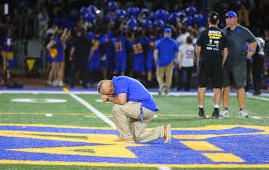When things go wrong, be it in life, in sport, in business, in relationships, our first tendency is to blame others. This has been wonderfully encapsulated in the following well-known piece: “One day a university professor bemoaned about his students that, ‘Such rawness is a shame; Lack of preparation in the school is to blame.’ On hearing this, the Sixth Form teacher countered, ‘Good heavens, what crudity! The boy’s a fool. The fault, of course, is in the Lower school.’ Immediately the Secondary school teacher retorted that, ‘From such stupidity may I be spared; they send them up so unprepared.’ Unsurprisingly, the Primary teacher school explained, ‘ECD blockhead! And they call that preparation! Worse than none at all!’ In turn, the ECD teacher declared, ‘Such lack of training never did I see! What kind of woman must his mother be?’ Naturally, the mother had an answer, ‘Poor helpless child; he’s not to blame. His father’s people were all the same.’ Not to be outdone, however, ‘Said the father’, keeping in line, ‘I doubt the rascal is even mine.’”
If we are quick to pass the buck and blame others (for our failures) we need to pass the cup and claim others, in other words give credit to others (for our successes). So the beaming coach might claim that his coaching was the key to the player’s success until his school First team coach counters with the claim that the player would never have thrived under that coach if it had not been for his coaching at school, only for the junior team coaches to come in and declare that it was their training and coaching that was crucial in providing a good foundation. But then the Primary school coaches will chime in that they saw the talent and nurtured it in the crucial foundational early years, without which the child would never have got anywhere! The ECD teachers will then confirm that they instilled a delight in games and sport as well as the fundamental eye-hand coordination which was essential for the player to go on to achieve great results later in life. Not to be outdone, the father will then argue that it must be his genes and his support that has produced this sporting genius until the mother reminds everyone that without her the child would not have gone anywhere.
Did we notice, however, that in the passage that apportions blame to others, from the professor right through the education system to the father, which person did not get the blame? No-one even mentions the pupil himself; no-one, that is, except the mother, who argues (predictably!) that the child is not to blame. Yet when it comes to the successes the player will be quick to claim the credit, despite everyone else chasing him down for the honour.
Greg Norman was a brilliant golfer, winning eighty-nine tournaments around the world including two Major Championships. He once admitted (with astonishing accuracy!), “I owe a lot to my parents, especially my mother and my father”! Parents do deserve a great deal of credit for their child’s sporting success but really, the truth is that many people play an important part in the player’s development. In fact, everyone must play their part in a child’s and player’s development.
This thought perhaps is emphasised when in the first episode of ‘The Last Dance’, the popular documentary on his life, the great basketball player, Michael Jordan, is quick to point out that it is the players that have brought great success to the Chicago Bulls, and not the management of the franchise. The administrators may have provided a strong financial foundation for the club to have success but the players and not the administrators go on court; it is the players who bring success to the club. However, it actually goes far beyond that: it was the players, coach, backroom staff, fans, partners and more, all of them played some part in bringing success to the team.
John Wooden, the highly-successful college basketball coach in the US, always said that “The star of the team is the team”. The sooner we teach our children that lesson, the sooner they will be equipped to face the reality. In contrast with the blame game, in the claim game perhaps too much credit is given to the individual and not enough to those around him. No-one seems to want to take responsibility for our children’s failures but everyone wants the credit for any success. Those are poor lessons for our children to learn. Everyone, including the individual player, must share the blame and the claim. Let us gladly and humbly give due recognition to all who play a part – including the late mother of this writer, without whom this article would obviously not have been possible!




